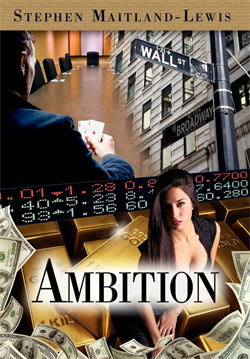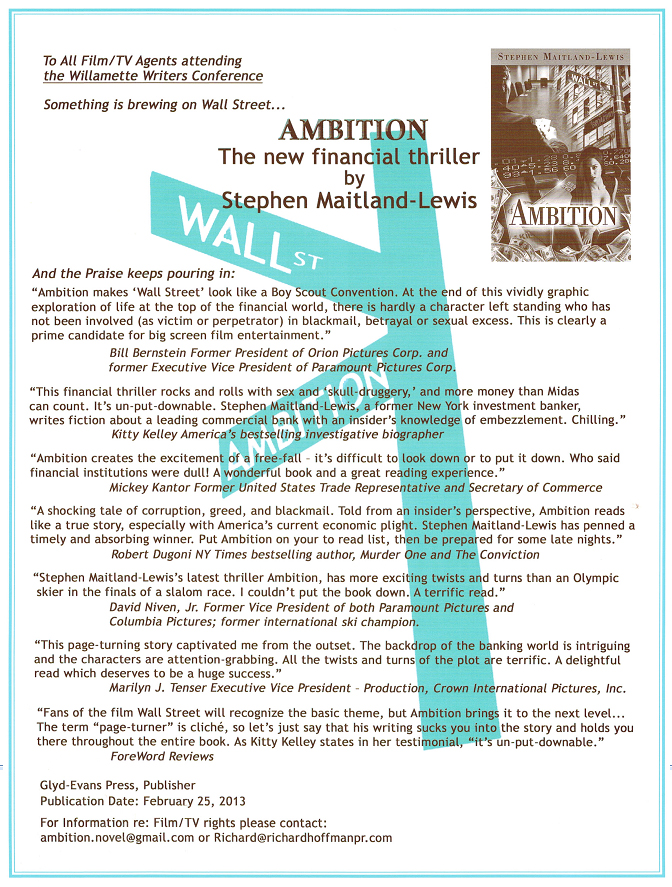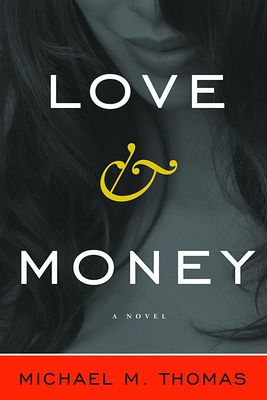When I saw the ad in the Willamette Writers conference brochure for Stephen Maitland-Lewis’s new novel, Ambition, the lavish endorsements primed me for reading the business fiction answer to Dostoevsky’s Crime and Punishment. (Among the blurbs were ones by Kitty Kelley and Robert Dugoni – the ad appears below.) So I downloaded the Kindle version and read it over the next twenty-four hours.

The story begins as a very nervous banker, George Tazoli, is attempting to withdraw $75,000 and wire $7 million from an account in a Los Angles bank, which is just around the corner from the bank where he had worked until “this morning.” We can surmise that George is probably a rogue banker who is getting ready to bolt with stolen money. The scene is just a prologue, though, and the first chapter moves us several months backwards in time.
Peter Donovan, the president of the bank, is married to an independently wealthy social climber. Their only daughter Samantha (Sam), also independently wealthy, is a sexually liberated, self-indulgent, and aggressive climber who, much to the chagrin of her parents, has her sights set on George Tazoli.
Peter is under intense pressure from his board members, most of whom consider him to be incompetent and somewhat of a joke. The board instructs Peter to rid the bank of more than a billion dollars in problem loans. Peter decides to task George with liquidating the loan portfolio and transfers him to New York in order to, shield him from “interference” from other bank officers and board members, and, more personally, cool his daughter’s ardor. The assignment also gives Peter an excuse for periodic trips to New York to participate in high stakes poker games and sexual debauchery in his Manhattan honey pad.
During a short stay at Peter’s apartment, George discovers evidence of Peter’s bad habits and immediately shows the evidence to his cousin Draeger, a shrewd, unscrupulous operator at a small brokerage firm. They formulate a plot to embezzle funds from the sale of the problem loans and use the “evidence” to blackmail Peter in case he discovers their chicanery.
With the assistance of Draeger’s sister-in-law Xhana, with whom George is having an affair, the cousins start selling the problem loans and pocketing the spreads between the bank’s minimum selling price and the price they actually receive from the buyers. The “take” quickly escalates to tens of millions of dollars. Meanwhile, Sam gets pregnant and insists on a quick, private Las Vegas wedding; she sweetens her demand by giving George wedding presents worth several million dollars.
When Peter learns about the wedding, he is furious with George, whom he regards as a low-life fortune hunter. When Peter threatens to fire him, George reveals the evidence of Peter’s extra curricular activities, thus buying himself and Draeger some time to continue their embezzlement. But Peter hires a private detective who discovers George’s affair with Xhana. The discovery unravels their scheme and George and Draeger flee to avoid arrest.
So, does this novel live up to it’s endorsements? Not quite. They promised five-star entertainment. A two-star beach read is more realistic. Here are my top five criticisms.
- Absence of a plausible conceit. The plot hinges on the fact that the board, whose members think Peter is inept, allowing Peter to personally take charge of liquidating a billion-dollar problem loan portfolio in the absence of the normal checks and balances that banks must enforce to comply with bank regulations.
- A cast of unlikable characters. Every single character in the novel is ethically challenged, devoid of empathy, and obnoxious. They are willing to steal, lie, manipulate, and betray to serve their selfish agendas, making it difficult for readers to root for any of them.
- Some of the key turning points depend on coincidences. For example:
- George discovers Peter’s gambling and prostitute habits solely because Peter failed to lock the safe in which he stores the video camera and Polaroid photos that serve as evidence; notwithstanding the fact that Peter’s wife occasionally uses the apartment. Without that contrived incident, there would be no novel.
- Peter arranges to put out a contract on George’s life. When the assassin is about to kill George, he recognizes George’s Uncle Frank, an ex-NYPD cop with whom he served, and who conveniently drops into George’s life to invite him to a birthday party. The two old police buddies work out a scheme to allow George to escape so he can flee to Brazil. It is patently obvious to the reader that the only reason Uncle Frank is a character in the novel is to foil Peter’s plot to kill George. Talk about coincidences!
- Finally, (and this may be just the author’s style) I found the dialog to be plodding and turgid and the exposition less than elegant.
So, why the enormous gulf between the ebullience of the endorsements and the quality of the novel? It’s obvious. Maitland-Lewis has lots of celebrity friends, all of whom are willing to lend a hand to promote his career. Good for him!
I wish Maitland-Lewis every success in selling Ambition to a producer. In the hands of a good scriptwriter and directors it might make a passable movie (ala Arbitrage or Paranoia).

 Since starting The Business Fiction Blog, I have made it a point to visit
Since starting The Business Fiction Blog, I have made it a point to visit